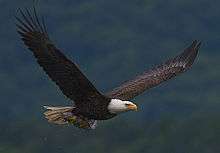Eagle-bone whistle

The eagle bone whistle is a highly sacred religious object, used by some members of Native American spiritual societies in particular sacred ceremonies. They are made from bones of either the American bald eagle or the American golden eagle, and are considered extremely powerful spiritual objects.[1][2][3]
Use
Eagle bone whistles are only used in certain ceremonies in the Southwest and Plains cultures.[1] The eagle bone whistle may be considered as a ceremonial or sacred object which may not be considered a musical instrument, if music is defined as entertainment: "There is no time or need...to wallow in distinctions between a feather-and-bone raptor and a bone whistle avian mysticism; one would no doubt end in dichotomous Western readings thereof."[4]
The whistle is used in some Peyote ceremonies of some sects of the Native American Church.[5] Eagle bone whistles are used in a number of Sun Dance cultures, such as the Crow.[3] The eagle-bone whistle is also used by the Lakota people in certain ceremonies,[4] such as some Sun Dances.[6]
Navajo/Ute flutist R. Carlos Nakai claims to use an "eagle-bone whistle" (or possibly an imitation one) on multiple albums.[7]
Federal law
Both the bald and golden eagle are protected by federal law: the Migratory Bird Treaty Act of 1918 (MBTA) prohibits the taking, killing, possession, transportation, and importation of migratory birds, their eggs, parts, and nests except as authorized under a valid permit as outlined at 50 CFR 21.11[8][9] The MBTA authorizes and directs the Secretary of the Interior to determine if, and by what means, the hunting of migratory birds should be allowed, as well as to adopt and implement suitable regulations permitting and governing the hunting of any type of migratory bird (for example, hunting seasons for ducks and geese). The Eagle feather law is another name for the exemptions to this act that are sometimes granted to enrolled members of federally recognized Native American tribes. Penalties under the MBTA include a maximum of two years imprisonment and $250,000 fine for a felony conviction and six months imprisonment or $5,000 fine for a misdemeanor conviction. Fines double if the violator is an organization rather than an individual. These laws would apply to the collection and use of eagle bone whistles.
See also
References
- 1 2 Maroukis, Thomas Constantine (2005). Peyote and the Yankton Sioux: The Life and Times of Sam Necklace, p.174. University of Oklahoma. ISBN 9780806136493. "Some of the visitors join us in all our social, spiritual, and other activities and become adopted members. This book was written by such a man [Maroukis], who came to visit us and was accepted into our family over the last fifteen years." Leonard Bruguier, "Foreward", p.xii-iii.
- ↑ Maroukis, Thomas C. (2012). The Peyote Road: Religious Freedom and the Native American Church, p.84. University of Oklahoma. ISBN 9780806185965.
- 1 2 Fred W, Voget (1984). The Shoshoni-Crow Sun Dance. The Shoshoni-Crow Sun Dance. University of Oklahoma Press. p. 308. ISBN 0-8061-1886-5. Retrieved 22 May 2011. "I wish to express my gratitude to the many Crows who contributed information assistance," Preface, p.xvi.
- 1 2 Gannon, Thomas C. (2009). Skylark Meets Meadowlark: Reimagining the Bird in British Romantic and Contemporary Native American Literature, p.227. University of Nebraska. ISBN 9780803226166. "For their use in the Sun Dance, see Standing Bear, My People 114; Fire and Erdoes 198, 206, 210. ... Momaday mentions the use of the eagle bone whistle in a Kiowa ceremony (Way 39)", p.363, n.40.
- ↑ Swan, Daniel C. (1999). Peyote Religious Art: Symbols of Faith and Belief, p.29. University of Mississippi. ISBN 9781578060962.
- ↑ Melmer, David (6/11/2007). "Bald eagles may come off threatened list", IndianCountryTodayMediaNetwork.com. Retrieved July 2016.
- ↑ R. Carlos Nakai at AllMusic. Retrieved 14 July 2016.
- ↑ "50 CFR 22.1 - What is the purpose of this part?". Cornell University Law School - Legal Information Institute. Retrieved 15 July 2016.
- ↑ "Migratory Bird Management Information: List of Protected Birds (10.13) Questions and Answers" (PDF). US Fish & Wildlife Service. 17 September 1999. Retrieved 7 August 2015. As amended 20 May 2008.